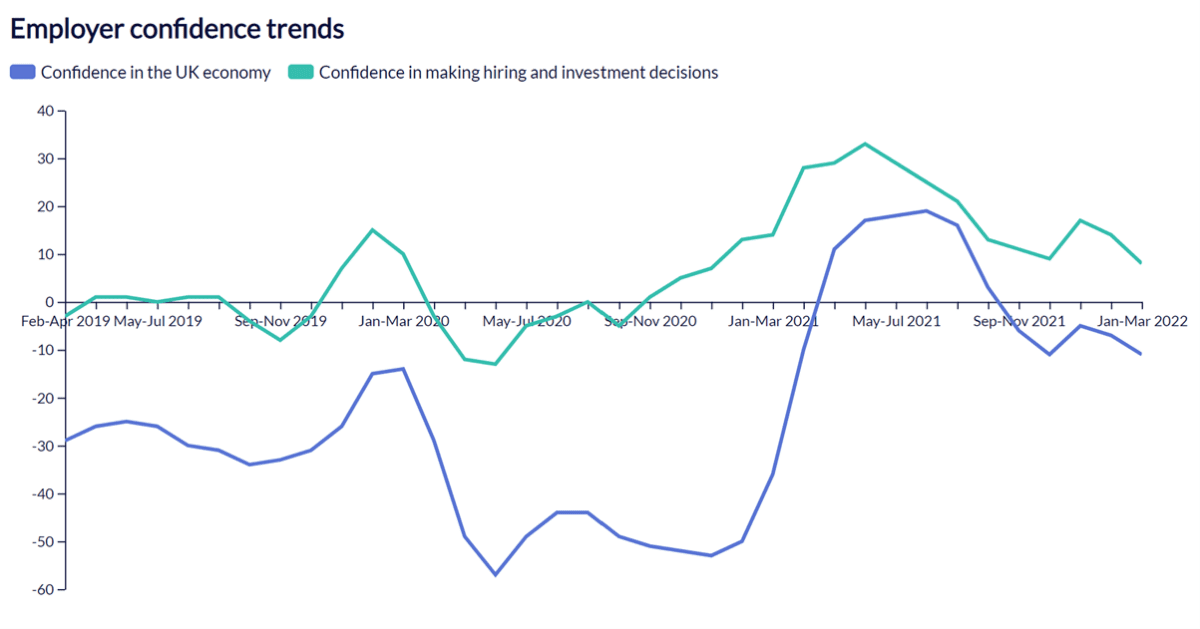More employers look to hire permanent staff despite economic worries

Employers’ confidence in the UK economy took a turn for the worse during the first quarter of 2022 as inflation reached its highest for 30 years. That’s according to new data from the Recruitment and Employment Confederation (REC).
In January-March 2022, employers reported worsening expectations for the UK economy. The REC’s measure of business confidence in the economy improved slightly in the New Year but then fell back to net: -11 in January-March, the same level as in October-December 2021.
Despite this, more employers remained positive than negative about their ability to hire. The REC’s JobsOutlook survey found that UK businesses’ confidence in hiring was at net: +8 in January-March 2022. This was one percentage point lower than in the last quarter of 2021.
In particular, employers’ intentions to hire permanent workers have spiked over the past three months, diverging from the economic outlook, perhaps reflecting challenges in filling vacancies. Hiring intentions for permanent staff in the short term increased by nine percentage points to net: +28, quarter-on-quarter. Medium-term hiring intentions also rose by seven points to net: +26.
Neil Carberry, Chief Executive of the REC, said:
“Businesses are seeing tax rates and uncapped energy costs rise, as well as pressure on salaries from staff who are seeing their own bills go up. So it is no surprise that firms are more concerned about the outlook. But British firms are resilient and investment in staff and growth remain on the agenda when employers think about their own business. We expect to see employers’ hiring plans decouple further from their economic outlook over the coming months as they face a tight labour market. Firms will need to find new, creative ways to attract candidates, as well as keep hold of the talented staff they have. Recruiters will play a vital part in helping them to do so.
“More employers are switching their hiring intentions towards permanent staff, as the urgent need for contingency staff to cover Covid absences decreases. But temporary workers remain vital to managing uncertain and fast-changing markets.”

Other stats from the latest Jobs Outlook include:
- Quarter-on quarter, hiring intentions for temporary agency workers declined by 14 percentage points in the short term and by eight points in the medium term. However, both measures remained robustly positive at net: +16 and net: +15, respectively.
- In March, almost one in five employers (18%) said that the increase in National Insurance contributions will reduce their ability to invest in their business, while one in six (15%) said this will discourage the creation of new roles.
Sector Response
Cecilia Holmblad, HR Tech Evangelist at Winningtemp:
“The latest study published by Recruitment and Employment Confederation suggests that despite a tough economic forecast, many industries are still experiencing an increased demand for staff. Although it’s great to see that many businesses are now looking to hire new employees, these employers should also ensure that they have effective and efficient onboarding process in place to help new hires settle within their workplace. This means ensuring that the new employees feel welcome and comfortable in their new surroundings, as well as able to start making a difference to the business almost immediately.
Creating a unique and personalised onboarding experience for each employee may sometimes prove to be challenging, especially when the company is trying to hire at scale. To overcome this, organisations can use AI-enabled surveys to gauge if the new employee understands their role and is well-equipped to fulfil their primary responsibility. These surveys can also be used ensure that employee’s expectations are well aligned with the company’s goals, which in turn helps with improving productivity, job satisfaction and long-term commitment towards the organisation.”











Responses